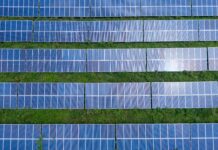by Doug Young
China sent an important message to the struggling solar panel sector last week when one of the country’s major manufacturers was forced to turn to global capital markets to raise new funds, hinting that it couldn’t receive the money from state-backed domestic sources. The move sparked a sell-off for New York-listed shares of Yingli Green Energy (NYSE: YGE), as its request for funds met with a frosty response on Wall Street.
The fact that Yingli had to seek funding from commercial-oriented western investors indicates Beijing is taking a hands-off approach to financing for this important but embattled industry as it tries to emerge from a 3 year slump. Chinese leaders should continue to send similar signals not only for the solar sector but also other key industries, in a broader effort to wean them from state support and create sustainable companies that can become global leaders.
Yingli hasn’t posted a profit for more than 2 years, and reported a net loss of $128 million in its most recent reporting quarter. The company and most of its peers have been losing money since 2011, when the industry tumbled into the red due to overcapacity.
The downturn caused many firms to go bankrupt, with former giants Suntech (OTC: STPFQ) and LDK Solar (OTC: LDKSY) as the 2 most prominent examples in China. In the meantime, the financial position of surviving players like Yingli remains weak as prices finally start to rebound. To shore up its position, Yingli turned to Wall Street last week to raise a relatively modest $83 million through the issue of new American Depositary Shares (ADSs) in New York where its stock is currently traded.
The company ultimately sold the shares for $3.50 each, or more than 20 percent below its stock price when it first announced the plan. (company announcement) The need for such a big discount reflected ongoing investor concern about both Yingli and broader prospects for the solar sector’s recovery. Announcement of the discount sparked a sell-off in Yingli’s shares, which tumbled 18 percent in the 3 trading days after the plan was first announced, wiping out around $100 million in shareholder value.
Yingli’s decision to tap western markets for its fund raising followed two similar earlier developments that showed Beijing was taking a more hands-off approach to the solar panel sector in the uphill climb from its downturn.
The first of those came in February, when Canadian Solar (Nasdaq: CSIQ) announced plans to issue new stock and bonds to raise $200 million. That announcement sparked a smaller 8 percent sell-off in Canadian Solar’s shares as investors also greeted the plan with limited enthusiasm, even though the company is one of the few to recently return to profitability.
The second sign of Beijing’s laissez faire approach came last month when mid-sized panel maker Chaori Solar (shenzhen: 002506) missed an interest payment on some of it domestic bonds, becoming the first default on such domestic corporate debt in modern Chinese history. Many viewed that move as a sign that China was preparing to allow similar defaults on corporate debt, and abandon its past practice of sending in state-run entities to rescue such companies.
In all 3 cases, it would have been quite easy for Beijing or local governments to come to the assistance of Canadian Solar, Chaori and Yingli. Officials could have provided critical assistance in a number of ways, such as ordering local state-run banks to make low-interest loans or calling on other state-run entities to provide funding.
But in each instance, the government has shown a determination to let market forces dictate developments, even if that meant wiping out millions of dollars in investor value or shaking the domestic corporate bond market by signaling the potential for more defaults. Such actions may cause some pain in the short term for companies, their investors and local economies, but will help to create a profitable, sector that can be commercially viable over the longer term.
Beijing should extend this market-oriented approach to other sectors that are also struggling with overcapacity, such as steel and aluminum, which would help to build commercially viable industries over the longer term. In place of direct financing, it could gradually introduce less aggressive, more western-style incentives like tax breaks to foster growth in sectors it wants to develop.
Such an approach will inevitably create some pain for the affected sectors, forcing plant closures and lost investment dollars. But over the long run it will put China’s economy on a sounder footing to ensure healthy sustainable growth.
Bottom line: Yingli’s move to raise capital in New York signals Beijing will take a laissez faire approach to the solar sector as it claws its way back to health.Doug Young has lived and worked in China for 15 years, much of that as a journalist for Reuters writing about Chinese companies. He currently lives in Shanghai where he teaches financial journalism at Fudan University. He writes daily on his blog, Young´s China Business Blog, commenting on the latest developments at Chinese companies listed in the US, China and Hong Kong. He is also author of a new book about the media in China, The Party Line: How The Media Dictates Public Opinion in Modern China.






